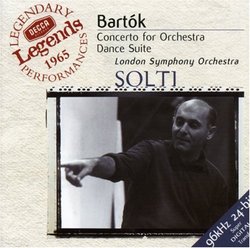| All Artists: Sir Georg Solti Title: Bartok: Concerto for Orchestra, Dance Suite Members Wishing: 0 Total Copies: 0 Label: Decca Import Original Release Date: 1/1/1965 Re-Release Date: 2/19/2001 Album Type: Original recording remastered, Import Genre: Classical Styles: Forms & Genres, Concertos, Historical Periods, Modern, 20th, & 21st Century, Symphonies Number of Discs: 1 SwapaCD Credits: 1 UPC: 028946768624 |
Search - Sir Georg Solti :: Bartok: Concerto for Orchestra, Dance Suite
 | Sir Georg Solti Bartok: Concerto for Orchestra, Dance Suite Genre: Classical
|
Larger Image |
CD DetailsSimilar CDs
|
CD ReviewsAbsolutely Spectacular! Josef Krebs | Seattle | 04/26/2001 (5 out of 5 stars) "Perfect, perfect, perfect. A perfect idiomatic reading from a brash and enthusiastic younger Solti. The London strings are just as scratchy as you'd want them in Concerto for Orchestra, perfectly flattened in the finale. The tempi, the balance, the color, all exactly what a long-time admirer of the music would want. Easily an equal of the Reiner or Boulez readings. Dance Suite here is a rollicking good time, sort of the Eastern European version of Rodeo. And a pretty darn good Mandarin Suite thrown in as bonus." Which of Solti's Bartok collections is best? Santa Fe Listener | Santa Fe, NM USA | 04/27/2007 (5 out of 5 stars) "This remastered analog collection from London features two works that Solti recorded decades later in digital sound in Chicago, the Bartok Concerto for Orchestra and the Dance Suite. Both CDs contain a third work, the Music for Strings, Percussion and Celestra from Chicago and the Miraculous Mandarin Suite from London. Since these are all acclaimed recordings and Solti's Bartok was one of his strongest composers, I thought a side-by-side listen would be helpful. Sound: Decca set out to produce sonic spectaculars in both cases, and in both cases succeeded. The earlier analog sound from London is miked closer and is free of digital edginess. The new remastering of the Chicago recordings has successfully removed the sting form the original CD issue, and though the CSO sits farther back, the sound has great visceral impact. Let's give a slight edge to Chicago. Execution: You might assume, especially after reading the reviews at Amazon, that the CSO plays so spectacularly that there is no comparison with the London Sym. But Solti was both a powerhouse and a technician. I can't hear that much difference, except that the LSO's wonderful precision of attack isn't quite the super-precision of the CSO, especially in the violins. On the other hand, the LSO soloists play with more personalaity. Call it a draw. Interprettion: Solti's Bartok was always fast, fierce, precise, and a tad clinical. Not for him the looser phrasing and warmer tone of Ivan Fischer. Having set his interpretation in place, Solti didn't change his timing or phrasing except by indignificant degrees. These two Concertos for Orchestra have an identical approach. However, the Dance Suite form London is hair-raisingly exciting, which isn't true of the Chicago version. And the Miraculous Mandarin Suite from London is even more thrillingly brutal; Solti gives this music the shock treatment, to great effect. By comparison, his MFSP&C from chicago is decidely lackluster. In the end, it's the couplings that sell me on the London collection. For sheer excitment, Solti's earlier Dance Suite and Miraculous Mandarin qualify as two of his best recordings. As for the main attraction, both versions of the Concerto for Orchestra come out essentially equal." CONCERTO, SYMPHONY, SUITE DAVID BRYSON | Glossop Derbyshire England | 07/08/2005 (5 out of 5 stars) "Bartok had a dry and ironic sense of humour, and I suspect he was teasing us a bit when he talked about the Concerto for Orchestra as being `symphony-like' with allegedly `concertante' treatment of the instruments in the band. He could have said the same about the treatment of the instruments in the Dance Suite, and I could say much the same about the orchestration in the symphonies of, say, Prokofiev. It's not the way Sibelius for one writes for orchestra, but to me it seems just the natural outcome of the increasing virtuosity of orchestral players in the 20th century. Nor does the work seem symphonic to me in the least. Several of the movements would be of symphonic length in Sibelius if not in Shostakovich or Mahler, but the Concerto for Orchestra really seems a rather ambitious orchestral suite to me. The movements have a looser relationship among themselves than I associate with symphonies, and despite the seriousness of the tone at many points the material is not `worked' in what I would think of as a symphonic way either. If Bartok had called it a suite, I doubt that any of us would be worrying much about its classification as a symphony or as a concerto.
Solti's account has enjoyed the status of a classic for many years now, a status I'm more than happy to endorse. The tempi are admirable, and the LSO is on its best form. The recorded quality does not have quite the vividness of some modern versions, notably that by Ivan Fischer, and I felt this particularly in the Elegy movement, but such comparisons are only between very good and even better and they would not particularly sway my own choice. In any case I still feel to this day that Solti handles one of my own favourite moments, the `raspberry' blown by the trombones (very deservedly in my opinion) at the theme from the Shostakovich 7th in the Intermezzo Interrotto, probably better than anyone else. This is a thoroughly recommendable version still, I'm quite convinced. If cost is a factor in anyone's decision it has that in its favour for one thing. Choice of coupling could well be important too. Solti offers the Dance Suite, 20 years earlier in date of composition than the Concerto, and it is likely to be a popular choice, especially as the level of brightness in the recording is toned up a little. Fischer has the 3 Village Scenes plus what would tip the balance for me, the early symphonic poem Kossuth. I'm not you, so I can't be more categorical. If money and time are no object I would recommend obtaining both versions. If it has to be one version and one only, either spin a coin or decide on the basis of price or coupling." |

 Track Listings (12) - Disc #1
Track Listings (12) - Disc #1
